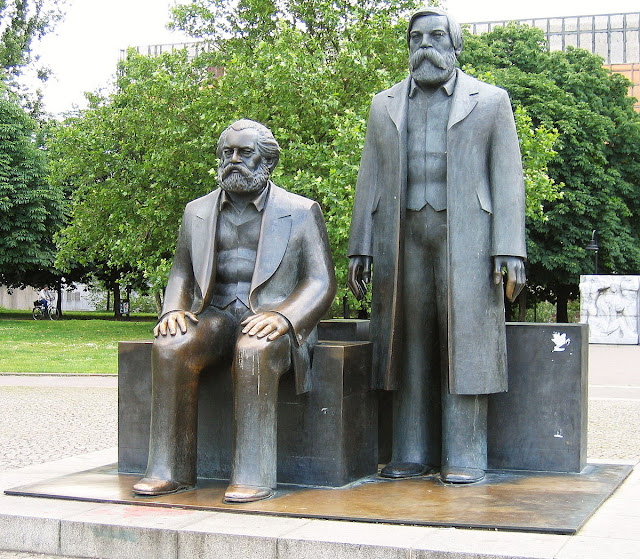Karl and Friedrich's Execrable Adventure
Karl and Friedrich's Execrable Adventure
The Vogue of Bad Ideas
Having
undertaken the chore of slogging through some of the verbose
ramblings of Karl Marx in his The Communist Manifesto and Das
Kapital, and after hearing
and reading many erudite and reasoned assessments of the great
bearded sage’s life and theories, I have come to the reasoned
understanding that Karl could best be summed up as a layabout,
itinerant moocher and generally worthless consumer of the fruits of
other people’s labor, who endeavored
to justify his sins of
indolence by penning wordy ramblings of suspect
credibility
in order
to cover for his
glaringly parasitic
existence.
He has been
hailed by many as one of the great theoreticians, polemists and
political thinkers of the modern era. His theories have been hailed
as weighty, profound and intellectually engaging. They have stirred
the minds and captured the emotions of millions. His grasp of
mankind’s longing for a producible and reproducible social system
of order, justice and fairness led him to propound a body of work
which was grand in scope, all-encompassing in regards to human
interactions, bold in its ingenuity and profoundly and indisputably
wrong.
In fact,
Marx and his BFF Friedrich Engels were wrong about so much in their
theories and observations that the exegesis of those errors literally
fills volumes. I just wanted to cover a couple of them here and use
those intellectual blunders to illustrate how the exuberance of our
country’s youth for all things Marxian is not only going to leave
them morally and intellectually bankrupt, but will also quite likely
help usher in a totalitarianism so sweeping and all-encompassing that
it would leave Joseph Stalin and Mao Zedong weeping for their own
lukewarm and middling accomplishments. And our horribly Stepfordized
progeny will accomplish all of this speedily if we don’t come to
our senses and realize that we are the adults in the room.
As
new and fresh-faced gaggles of university-indoctrinated social
justice warriors emerge from their hothouse cocoons in academia and
flutter off to the four corners of western civilization,
the world’s progressive institutions open their arms in joyous
welcome for
these
refreshing
cadres of new
acolytes—energetic and cacophonous heralds for all the politically
correct, expedient,
and without doubt, Marxist issues
of the day: income inequality, gender discrimination, climate change
catastrophe, toxic masculinity, and the ever-evil patriarchy. They
trumpet with parrot-like ignorance the platitudes they have been
spoon fed by their Marxist professors, dreamily oblivious to any and
all other points of view, as those countering viewpoints
are proffered
by no sane
individual who
desires
to continue receiving a paycheck at
our lock-step leftist universities.
One
of the major conceits of Marxism is the belief that human nature is
simply
a loosely aggregated
set of beliefs
and principles,
infinitely malleable,
as
changeable as the weather, and
ripe for engineering by those of sufficient insight and will (like,
say…..Karl Marx and his buddy Friedrich Engels.) There
is, of course, some obvious malleability to our thoughts and actions,
and societies have used everything from the rule of law to threats of
violence and death in order to shape those thoughts and actions, but
the drives for self-preservation—the
acquisition
of food, shelter and comfort for ourselves and our families (the
first and foremost social
unit) form a primary
and universal motivational drive and cause of action in all species,
human and otherwise, which
are stubbornly resistant to tinkering.
Almost
all societies have some form of rule of law—even if it is no more
that a common consensus on the disagreeableness of murder. And more
advanced societies have, obviously, more numerous and
situation-specific laws on which people can depend for not
only personal safety, but also improved
societal
interactions and the lubrication of commerce. These laws in most
modern societies are agreed upon, at least in theory or in part, by
agreement of the populace (purely dictatorial societies, on
the other hand,
receive these laws as direct and non-negotiable mandates.) One
of the foremost, and I would argue most counter-intuitive and deadly
ways in which Marx
and Engels part ways with
capitalist (his term) and free-market economies is in the fanciful
and now provably-wrong notion
that men and women will work as diligently and thoughtfully for a
nebulous collective as they would for themselves and their families.
That
grievous notion has
been proven wrong in many
and diverse locations, all the way from John Smith’s Jamestown
colony to Joseph Stalin’s Russia, Mao Zedong’s
China and the killing fields of Pol Pot. It’s
been
tried.
It fails horribly each and every time because when our personal
responsibility for our own and our families’ welfare is handed off
to some unseen
and unaccountable bureaucracy,
we can be assured that that
loss of responsibility for ourselves and our families will manifest
itself in inaction,
loss
of motivation,
and ultimately decay and death of both the
will
and the
body.
As
anyone who has lived long enough to see the Edsel, Betamax and New
Coke can attest, it is generally well understood that great ideas on
paper don’t always translate into great ideas in the real world.
Marxism is perhaps the epitome of that axiom, with the added negative
outcome of biblical-scale squalor, starvation and murder to really
drive the point home. Marx’s writings are an excellent example of
the old adage: If it seems too
good
to be true, it probably is. Marx promised Nirvana; his ideas and
policies delivered necrosis. It was death by a thousand good
intentions, all because—and this is the crux of the problem as I
stated earlier—he believed he could negate human nature via fiat.
We
have to ask ourselves how many times must this be proved wrong before
we actually take the lesson to heart? Karl Marx believed he could
create the Communist New Man out of the old one by disallowing him
every avenue of self-interest, self-preservation and
self-actualization and replacing those desires with some ethereal
commitment to a common good from which he would see little if any
benefit. Why would we be surprised when this fanciful notion
collapsed like a house of cards?
I
will grudgingly give credit to Karl and Friedrich for
one small insight which they stumbled onto
blindly and then predictably
twisted completely in on itself in execution: that
is the recognition of the benefits of decentralized control. When
Marx and Engels proposed
the idea
of taking businesses away from their rightful owners and then,
insanely and with absolutely no justifiable reasoning, turning them
over to the glorified “workers,” they appeared
to be recognizing
the inherent danger and proclivity to avarice and corruption which
concentrated power in the hands of the few was
wont to engender. But
shazam!
Would that they
could have seen the enactment of their
socialist/communist policies, in
those countries that adopted them, just
a few years down the road. They
nearly
all became
perfectly
distilled examples of the centralized criminality run amok that Marx
and Engels claimed
to be thwarting with their
new and ingenious ideas and policies. Their
writings helped usher in some of the most heinous and diabolical
governments in all of recorded history, and he in
part achieved that Machiavellian
feat by ignoring two very important human proclivities—one
of which I have alluded to already:
1) The natural inclination of all of us—human and animal—to
regard self-interest as a good and necessary quality for survival,
and 2) The absolute necessity of hierarchical systems in
civilization.
It
is a fantasy to believe that anything other than chaos will reign in
a society which does not support some form of hierarchy. To
deny leadership to those with the talent, drive and ability to
manifest
that
gift is to hamstring society
as surely as would happen if all decisions were put to a purely
democratic, all-encompassing and
every-one-included
vote. It is foolish
to believe that
a civilization could progress within that
constraint; it
would be a logistical nightmare. All
civilizations
of note in all of recorded history have
been hierarchical. Of
course there
probably
are some small
tribes buried in the hinterlands which are truly communal, but no
societies or civilizations of note have ever operated in a pure
Marxist and non-hierarchical fashion—it is just plainly and
provably unworkable.
And
sadly
these
two misunderstandings of human nature are becoming all the rage again
as a new generation of
public school and university students,
uneducated and unaware, leave
our houses
of learning full
of fire and zealotry to fundamentally transform society,
with the results being seen almost
nightly
on our local newscasts as these broods of social justice warriors
take to the campus
commons, the streets,
and
ultimately the boardrooms
to remake civilization in the image of their two failed and
discredited idols:
Karl Marx and Friedrich Engels.




Comments
Post a Comment